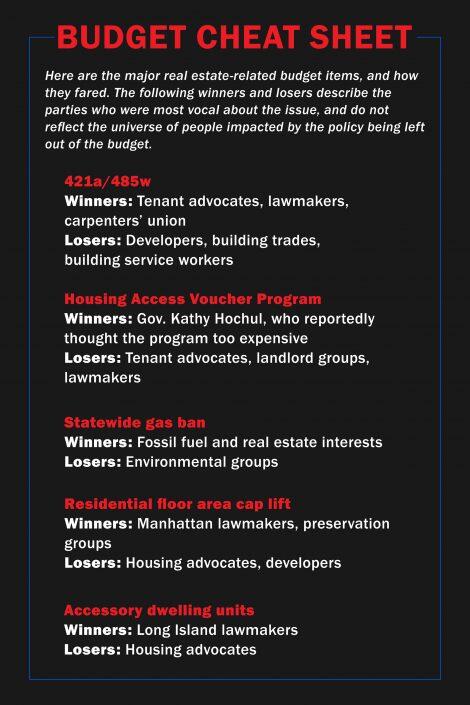For once, landlords and tenants can commiserate together: They both lost big in the state budget.
Various measures they supported were omitted from the state budget, meaning they would need to pass as standalone measures to become law this year. Politically, that’s a much heavier lift.
Most significantly, a lucrative property tax break did not make it into the final budget despite support from Gov. Kathy Hochul, real estate groups and prominent unions. This sets the stage for the tax break’s current iteration, 421a, to expire June 15.
It won’t go down without a fight, though. Developers call the program, which provides tax exemptions if a percentage of new housing units are set aside as affordable, essential to the creation of multifamily housing in the city.
In a joint statement, Real Estate Board of New York President James Whelan, New York Building and Construction Trades Council President Gary LaBarbera and 32BJ SEIU President Kyle Bragg said they are looking forward to continuing the conversation about Hochul’s alternative, 485w, or a similar program post-budget.
“Without it, the crisis will worsen as the city fails to produce enough housing to keep pace with population and job growth, and working people will pay the price,” they said.
An attempt to subsidize housing for homeless New Yorkers was also abandoned. The Senate and Assembly both proposed a $250 million voucher program similar to Section 8, but it did not make it into the final financial plan. The proposal had support from both tenant and landlord groups.
The budget will, however, include $800 million for the state’s depleted Emergency Rental Assistance Program. Another $125 million will be available for landlords whose tenants are unwilling to apply for state aid, and $250 million to cover utilities arrears, the governor said Thursday.
The governor announced a “conceptual” deal on the $220 billion spending plan Thursday, a week past the deadline. Debate dragged on over various policy issues, including bail reform changes, as well as controversial funding for a new Buffalo Bills stadium. The budget bills for fiscal year 2022-2023 still need to be voted on, but that is a formality once legislative leaders have agreed.
The governor had pitched other ways to increase the state’s housing supply, including a measure to legalize accessory dwelling units in areas zoned for single-family homes. She dropped it because opponents characterized it as an end to single-family homes, though it did not prohibit their existence or construction.
Another of the governor’s proposals was to lift the city’s cap on residential floor-area-ratio. The measure failed to gain momentum, just like similar legislation in years past.
In a surprise, a statewide ban on fossil-fuel heating systems in new construction was also not included in the budget. The governor proposed requiring new buildings to produce zero on-site carbon emissions by 2027, while the Senate wanted to ban natural gas and other fossil fuels in new construction starting in 2024. Environmental advocates and lawmakers blamed the Assembly for refusing to hash out a compromise.
Asked about the ban during a press conference Thursday, Hochul said she is “very interested in achieving these goals.”
Other issues never had a chance. Efforts to revive good cause eviction, which was left out of all budget proposals, failed to gain traction in negotiations. The measure would protect tenants against eviction if their rent increased by more than 3 percent or 1.5 times the regional inflation rate, whichever is higher.
Advocates are still pushing for good cause, which would likely need to be amended to have a shot of passing this session. It could also be part of a legislative package including 421a as a way to balance competing interests. But landlords beyond New York City, who are unaffected by 421a, are strongly against good cause.

